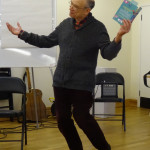Why do you write poetry?
Sometimes I write poems as a way to work out what I’m really feeling. Sometimes I write it to express my thoughts and ideas in ink on paper, as a way of emptying my brain. Occasionally I write poetry because someone has asked me to write on a particular subject.
Do you write anything other than poetry?
E-mails and Things To Do Lists, mainly.
Do you write for adults?
I don’t generally write for adults or for children. I write for me. Sometimes it comes out as a poem that is suitable for children, and sometimes not.
What books have you written?
A Patch of Black (a picture book, published by Macmillan), Sleeping Beauty (a verse reworking of the original tale, published by Big Cat Collins), The Language of Cat and My Life as a Goldfish (both poetry collections published by Frances Lincoln).
How long does it take to write a poem?
Usually between two hours and two weeks. I always finish a poem before working on the next one.
That’s quite unusual. I’m usually surrounded by half-finished poems.
What is the most unusual event, person or feeling that has inspired you to write a poem?
I’m not sure. But I remember that just before I started to write poetry again as an adult, I was walking my dogs and thinking about how I wanted to write short, portable nuggets of truth that would express how I felt about life. I was describing poetry without realising it.
Do you have a special time to write?
I like to start my poems in the evening as that’s when I get most of my ideas. But once I’ve started them, they are worked on day or night – sometimes both.
Do you visit schools?
Yes! I like to share my poems with children and I get a real thrill helping them to write poems, too.
How many schools have you visited?
I haven’t kept count, but have worked in a number of schools around the country. I recently returned from a visit to a French school in Prague. That was my first school visit abroad. The children were very impressive – most of them could write their poems in 3 languages.
Did you write poems at school?
No – but I wrote them at home, from the age of seven to around thirteen years old. I never showed my poems to anyone. I just wrote for my own amusement.
Did you enjoy school?
Yes, I did. I was a fairly quiet child who kept herself in the background. But I liked learning and enjoyed all subjects – except for Maths.
What could schools do to improve the way poetry is taught?
Start the day and end the day with a poem. Children need to be exposed to variety of voices and styles. Poetry needs to be heard and enjoyed first and foremost. Close reading and questions come later.
What has been your most memorable day as a poet?
It was the day I heard I’d won the CLiPPA prize for The Language of Cat. That was literally a dream come true.
What was your worst moment?
My worst poetry moment was having to first perform in public reading out my poetry as a consequence of winning the prize. I was extremely nervous and hated the attention. I’m a lot better at performing now because I’ve had to learn by experience. I’m almost at the stage of enjoying it now.
Have you any poems coming out in the near future?
I have a book of poems coming out in 2018 called A Kid in My Class (published by Otter- Barry Books). It will be illustrated by the soon to be ex- Laureate Chris Riddell and I’m really looking forward to its publication.
Have you any pets?
I have two naughty, yappy dogs called Woody and Buzz. They keep me company and get me out walking every day.
What football team do you support?
I pretend to support Arsenal to please my sons. They grew up next to the stadium and we used to keep score by listening to the roar of the home crowd.
What did you do before becoming a poet?
I was a teacher of children with special needs for twenty five years and got a lot out of it. I worked mainly with children who were autistic. It wasn’t dissimilar to working in poetry. Both involve effective communication, looking at the small details, making connections and having a sensitivity to the world around.
Have you any advice for young poets?
If you are serious about writing, don’t stop. I wish I’d carried on writing through my teens and into early adulthood.
Have you any plans for the future?
To write better and to learn the names of birds and identify their songs.
That’s a good plan. I’m pretty good at recognising the seagull’s cry.
May I plug this poetry competition that I’m judging with Chris Riddell? It’s for young poets aged 10 – 13. The link is here.
Do you have a web page?
Yes – it’s www.rachelrooneypoet.com
Thank you, Rachel.
(Rachel’s photo by Michael Thorn)





